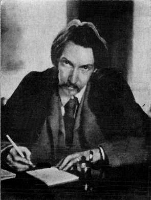Posts Tagged ‘Ayr’
Stevenson’s interest in Scots
Stevenson and Scots
Stevenson would have learnt Scots from Cummie, other servants, his maternal grandfather (“My grandfather… was one of the last, I suppose, to speak broad Scots and be a gentleman”, “Memoirs of Himself”, Tus. 29, p. 152), as well as Scots-influenced English of his parents and others.
He also consciously studied it: in “Pastoral” ! he describes learning words form the speech of John Todd, the Swanston shepherd. And in some the manuscripts we are now transcribing, we find records of conversations in Scots or just snatches of speech overheard that he has noted down.
Records of Scots in the notebooks
Stevenson tells us that “All through my boyhood and youth […] I kept always two books in my pocket, one to read, one to write in” (“A College Magazine”). Many of his notebooks have survived and EdRLS intends to transcribe some of these and offer them as an online resource.
At the moment, we (Mafalda Cipollone, Robert-Louis Abrahamson, Neil Macara Brown and myself) have almost finished transcribing the “Winter’s Walk” notebook. In this document we can see RLS noting down odd snatches of Scots he overhears as he walks along the coast road south of Ayr in January 1876. For example, he notes the following fascinating fragment:
dogs at farms, boys & snawbles. “Heres a mawn”. “Mither, Jock’s eatin snaw.”
The “Winter’s Walk” notebook (Yale, Beinecke GEN MSS 664 box 39 folder 859) contains a number of such transcribed snatches and longer dialogues, apparently written on the spot (the jerky handwriting shows that he was often walking along as he wrote). For example, in a village between Stranraer and Wigtown he overhears two locals talking about unsuccessful attempts to take the pledge and stop getting drunk:
Are ye goin to be teatotal again
I hafe no need of it.
Deed, ye’ve just as much need of it as me […]
– Aye.
– Hxxxx [unclear] Macfadyen just as much need of it as me.
– Deed, Weeliam I think about as much. (muckle?) […]
– I kept it nine month, by God and Macfadyen kept it a week.
– Aye Weeliam, ye kept it a long time.
– Deed; I kept it long enough, and he drunk.
“Keept” throughout
Notice the way that Stevenson is annotating the transcription: “(muckle?)” looks like a question to himself about whether the man said “much” or “muckle”, or whether “muckle” can be used here (in the phrase “as ….. as”); and the final comment records the way the two men pronounced “kept”. Does anyone know if this is a typical Ayrshire pronunciation?
A puzzle
In another notebook (Yale, GEN MS 664 Box 39 Folder 857: Notebook RLS/S) he writes notes of a visit to Greyfriar’s Churchyard, probably made on the spot, and includes the brief note of a phrase overheard, probably from the conversation of two sextons: “No that ill stockit”. Does this mean “Not so unpleasantly stubborn”? Could this refer to something (like a gate or flagstone) that was less difficult to open than forseen? Any ideas?

